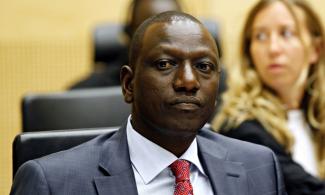
The gruesome murder of a man who had been due to testify in the international criminal court (ICC) trial of Kenya’s deputy president, William Ruto, has fed accusations that the government is orchestrating the killing of witnesses.

Meshack Yebei’s mutilated body was found floating in a river in the early hours of Saturday. His eyes had been gouged out, his genitals chopped off, his tongue cut out and he had been shot in the head.
Ken Wafula, a human rights activist who has been campaigning for justice for the victims of the killings, rapes and displacement that gripped Kenya following thedisputed 2007 presidential election, accused the government of targeting witnesses.
“All the witnesses are at risk,” he said. “Those who testified in The Hague and those who chose to recant their statements; they are all being hunted down.”
Family members say Yebei, 34, had been scheduled to testify against the deputy president, William Ruto, who is accused by the ICC of crimes against humanity in connection with post-election violence in which at least 1,100 people died and 650,000 were forced from their homes.
Yebei disappeared on 28 December from the town of Turbo in the Rift Valley province where he had taken a child for treatment.
His brother, Nixon Yebei, said the police had been reluctant to act after they were informed of Yebei’s abduction. “Since we found the body in the mortuary, we are yet to receive any feedback from the police,” he told the Daily Nation newspaper.
The director of public prosecutions, Keriako Tobiko, released a letter on Tuesday urging the police to carry out “a speedy and thorough investigation”.
But Ruto’s lawyer, Karim Khan, insisted that Yebei was in fact a critical witness for the defence, not the prosecution, and demanded that the police come up with answers. “News of his apparent abduction and murder is both shocking to us and a matter of grave concern,” he added.
The mysterious killing of Yebei has refocused attention on the question of the Kenyan government’s commitment to finding justice for victims of the wave of violence that gripped the east African country in early 2008.
Ruto and a radio journalist, Joshua arap Sang, are accused of inciting members of their Kalenjin community to kill dozens of members of the Kikuyu community who share an ethnicity with president Mwai Kibaki, who wascontroversially declared the winner of the 2007 election.
At the time, most members of the Kalenjin community supported Kibaki’s rival, Raila Odinga, who is now the opposition leader. They immediately rounded on members of the Kikuyu community, killing hundreds. Members of a Kikuyu gang, the Mungiki, a feared extortion cartel dreaded for its reputation of ritual beheadings, orchestrated revenge killings against perceived opposition supporters.
Prosecutors in The Hague contend that the killings were financed and incited by political elites. The defence teams, however, say the violence was spontaneous and driven by ethnic-based communal grievances.
The current president, Uhuru Kenyatta, was also charged with financing mobs to kill opposition supporters during that election. His case in The Hague collapsed last month after prosecutors complained that the Kenyan government had refused to cooperate with the prosecution and engaged in a campaign of witness bribery and intimidation, including exposing witnesses’ identities on social media.
Fatou Bensouda, the ICC’s chief prosecutor, told the Guardian: “We have seen constant challenges. Not only the lack of adequate and timely cooperation that we requested, but we had the issue of the interference with witnesses, even interference with potential witnesses, and those who were simply too terrified to come to the court to testify. We have those who have already given us their evidence but then decided to either withdraw it or to change their accounts.”
She denied that the dropping of the charges had damaged the credibility of the ICC. “All of this has hurt the case. This is what has happened and with that evidence as it is, knowing it would have to be sustained at conviction or trial, I did what I had to do. I was not in a position to proceed and I have withdrawn. I think this shows responsibility. It shows that the court will not just frivolously continue with a case that has been hurt. We will do the right thing and I believe that this should add to the credibility of the court and not the other way around.”
Human Rights Watch also criticised the government’s handling of the matter. Elizabeth Evenson, the organisation’s senior international justice counsel, said: “It’s clear that Kenya’s long tradition of impunity and pressure on witnesses have been serious obstacles to a fair process before the ICC. But these roadblocks make it all the more important for the ICC to assess how it can move ahead with high-profile cases against powerful people accused of serious crimes.”
The collapse of the case against Kenyatta, a Kikuyu, has added an extra layer of political intrigue in Kenya because it means only members of the Kalenjin community remain in the dock. The outcome of the case is expected to test the alliance forged by Kenyatta and Ruto to win the last election and could also strain ties between communities in the volatile mixed settlements of the Rift Valley.